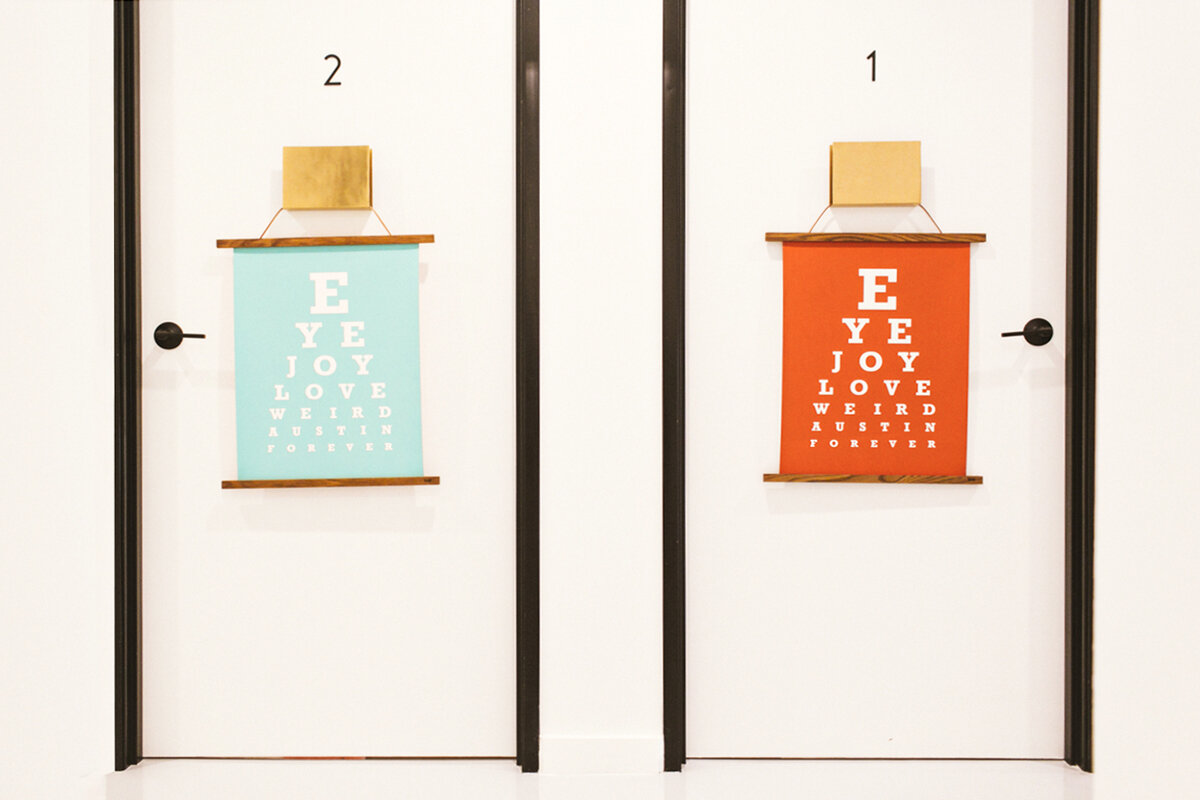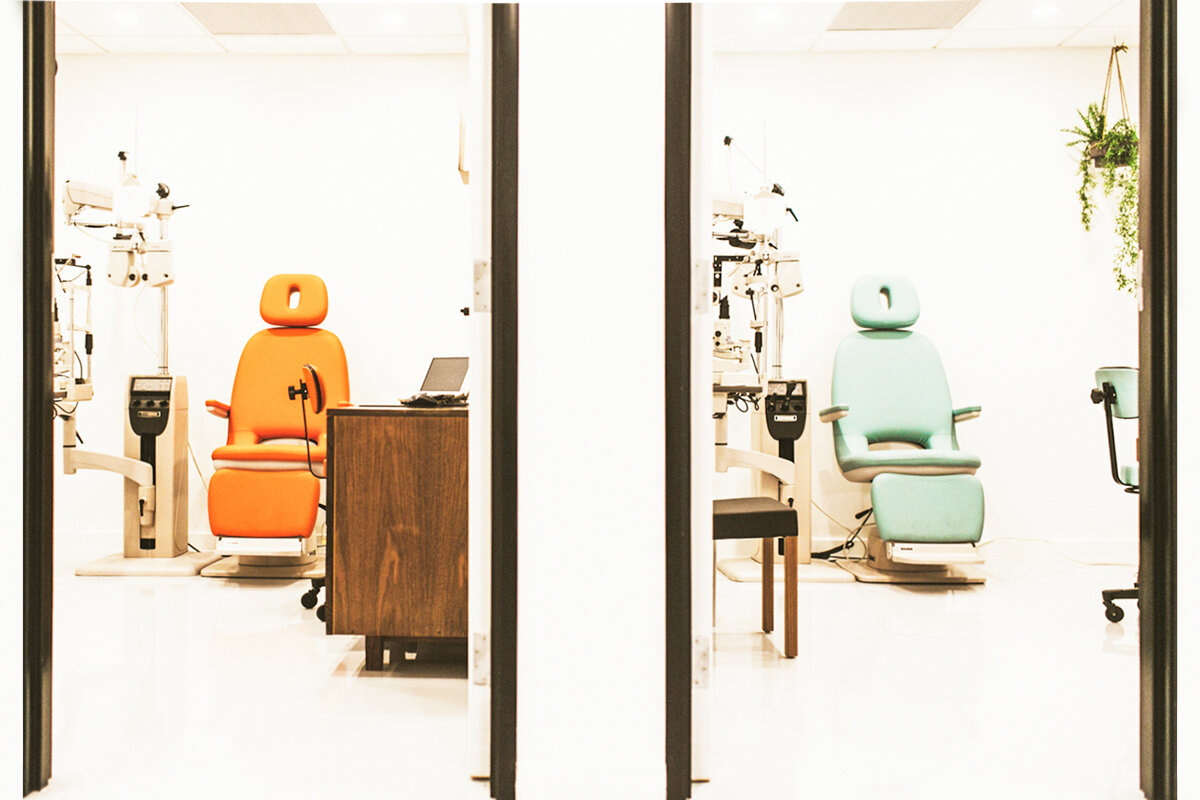We’re More Than What You See
We combine our medical expertise with a preventative approach to ensure all aspects of your lifestyle are taken into consideration.
We Prescribe
Glass. Contacts. Joy
We’ll help you see your best—whether it’s near, far, at your computer, or anywhere in between. All exams for glasses and contacts are tailored to you. After all, it’s your eyes, your needs, your habits.
We Treat
Red Eyes. Dry Eyes. Itchy Eyes.
Dealing with itchy, watery, or gritty eyes? Struggling with blurry vision and discomfort from contacts in Austin where allergies are rampant? Get the relief your eyes deserve — come see us today.
We Co-manage
Lasik. Cataracts. Glaucoma
Considering vision correction surgery? We co-manage LASIK. Our doctors provide unbiased input, discussing both the benefits and risks of LASIK so you can make a confident and informed decision.
Other Exam Services
-

Neurolens
Glasses RXs are more than just numbers. Neurolens is the world’s first and only prescription lenses that add a contoured prism to bring the eyes into alignment, relieving eyestrain and neck/shoulder pain that many people experience when using digital devices or reading.
-

Optos Imaging
Optos is an ultra-wide view retinal photo of the inside of your eye. This helps in early detection of eye diseases and systemic conditions by providing detailed images of the retina. It's a fascinating view — come see what's happening inside your eyes.
-

Optical Coherence Tomography
OCT provides high-resolution, cross-sectional images of the retina, helping us detect and monitor eye diseases in the early stages. We'll go over the actual scans with you, but don't worry— we'll explain the results in simple, non-medical terms.
Frequently Asked Questions
-
If you are new patient, please bring in your most recent glasses and contact lens prescription so we can let you know if your prescription has changed. If you have unusual ocular history, please have your previous eye doctor fax (512-364-0662) or email (hello@eyejoytexas.com) us your most recent medical records.
-
There are 2 parts to a routine eye examine. First, we check your vision to determine if you need glasses to help you see better. The second part is examining your eye health to check for common eye conditions.
-
The doctor is able to examine the front of everyone's eye without special testing. Checking the inside of the eye is limited by the size of your pupil. When the doctor shines a light to peek inside your eye, your pupils constrict, making it more difficult to look. To assist the doctor to get a better view, we recommend you get your eyes dilated (no additional charge) as well as photos (additional charge) of the inside of your eye.
-
We instill eye drops to get your eyes to dilate. Expect your examination to take over an hour if we dilate your eyes. Please be aware that dilation can cause your vision to be blurry for about 4-6 hours, especially at near. You will most likely not be able to read for several hours after your eye exam. If this is your first time getting your eyes dilated, please have someone drive you after your eye examine.
-
Dilating your eyes allows the doctor to get the widest view of the inside of your eyes, but some individuals are very light sensitive and have difficulty keeping their eyes during this procedure so the doctor's view will be limited. Taking a photo of the inside of your eye can allow the doctor to get a more detailed assessment of your eye health to check for certain eye conditions such as macular degeneration, melanoma, and diabetic retinopathy. The retinal imaging takes less than a minutes and there are no side effects such as blurred vision. Our doctors recommend all patients regardless of age to get both dilation as well as the retinal imaging. If you are not able to get dilated due to the side effects, we highly encourage to you get the retinal photo taken. The doctor will review the photos with you and it's pretty cool to be able to see the inside of your own eye! If you have an eye phobia and don't want the photos reviewed with you, no worries. Just let us know and we'll discuss your eye health without showing you the pictures. Click here to find out more about retinal imaging.
-
Our doctors highly recommend getting your eyes dilated but if you decline, we will still give you a glasses or contact lens prescription.
-
The doctor will discuss various contact lens options based on your prescription. You'll receive a complimentary pair of contact lens to ensure you're seeing well and that the contact lenses are comfortable. If you need to try different powers or brands of contact lens, there is no additional charge for this within 2 months of your initial contact lens exam.
-
After the doctor determines the best type of contact lens based on your prescription and eye health, we will spend about 20 minutes for your contact lens insertion and removal training. After your training, you'll go home with the contact lens to try them for about a week. The doctor will see you back to make sure you're doing well with the contacts. Be sure to come back for your follow-up exam wearing the contact lens (it's important to let us know in advance if you're not able to). Once the doctor has assessed you're experiencing good vision and comfort with the contacts, you'll be given a prescription to order contacts. Our staff will assist you with ordering.
-
The doctor will first need to determine what your glasses prescription is and then convert this to your contact lens prescription. We've already done the work to get your glasses prescription so whenever you come in for a contact lens exam, you'll get a copy of both your glasses and contact lens prescriptions. There is no additional cost to get your glasses prescription.
-
Our bodies and our eyes are constantly changing and an annual eye examine will make sure that your glasses and contact lenses are giving you the best possible vision. Contact lenses are medical devices regulated by the FDA so an eye doctor is required to place an expiration date on all contact lens prescriptions. The doctor needs to examine your eyes annually to make sure they are still healthy enough to continue wearing contacts. The standard of care in Texas for glasses and contact lens prescriptions is one year.
-
Younger patients can benefit from seeing an eye doctor who specializes in pediatric optometry or ophthalmology. Our specialty is not pediatrics, but if you are seeking a routine eye exam for your child, we can see patients 7 years old and up.



